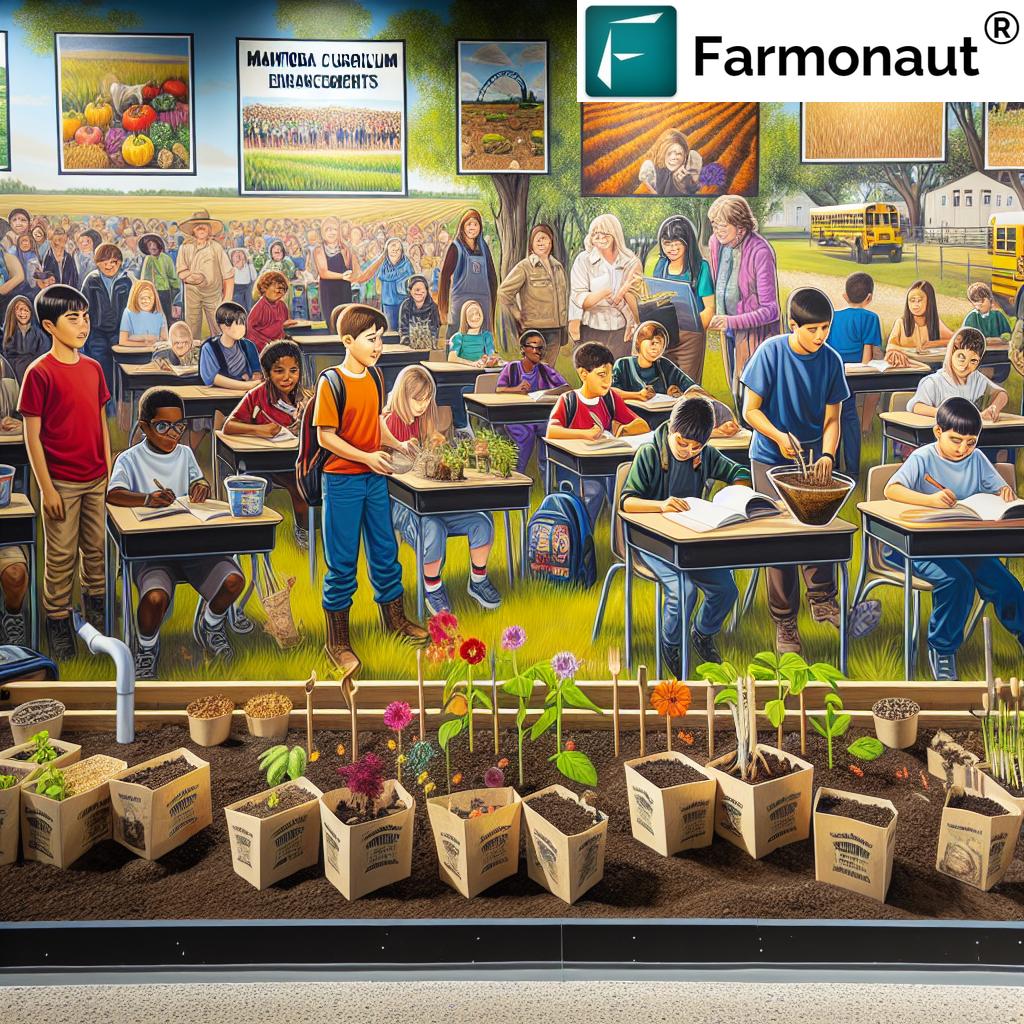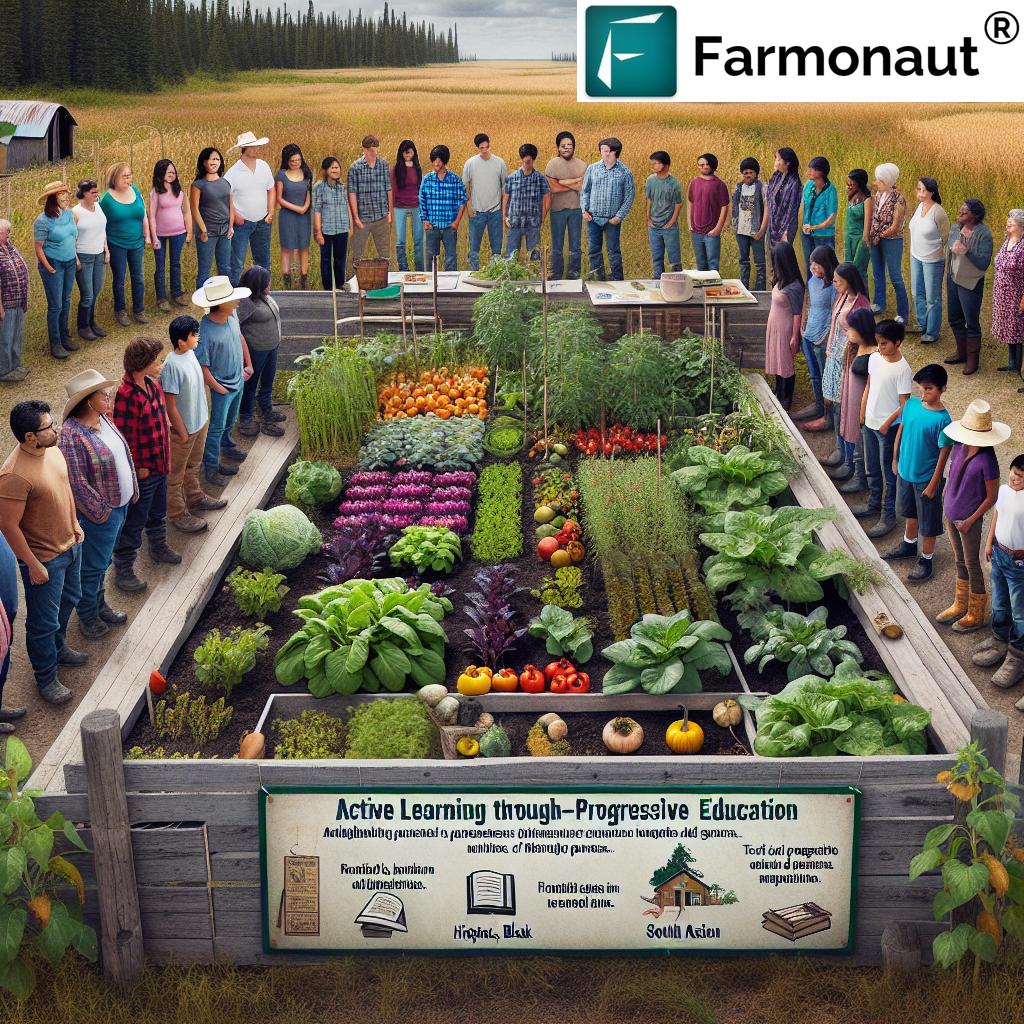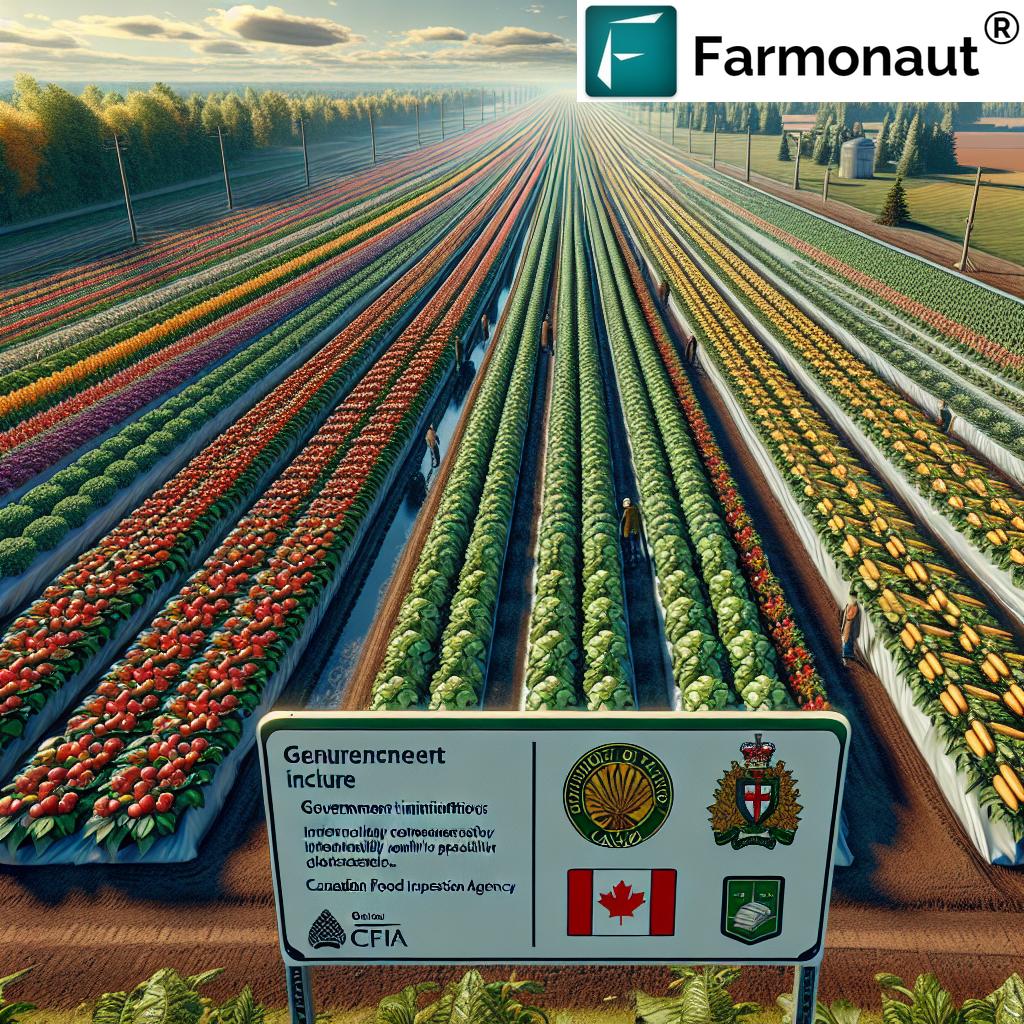Agriculture Education in Manitoba: 5 Powerful Ways Garden Kits Inspire
“Over 70% of Manitoba schools now use garden kits to boost crop literacy and environmental awareness among students.”
- Introduction: Why Agriculture Education Matters
- 1. Garden Kits Drive Crop Literacy for Students and Manitoba’s Future
- 2. From Seed to Harvest: The Power of Hands-On Learning in Agriculture
- 3. Building Public Trust & Food Literacy through Classroom Garden Kits
- 4. Cultivating Rural Farming Careers via Innovative Education Programs
- 5. Curriculum Enhancements & Technological Integration for Sustainability
- Comparison Table: Agriculture Education Initiatives in Manitoba
- Empowering Sustainable Farming: The Farmonaut Advantage
- FAQ
- Conclusion: Envisioning Manitoba’s Sustainable Agriculture Future
Introduction: Why Agriculture Education Matters in Manitoba
Agriculture has always been at the very heart of Manitoba’s heritage, economy, and landscape. As fewer of us grow up in rural settings and the connections between people and farming become less direct, fostering crop literacy, sustainable food practices, and rural farming careers among the next generation is more vital than ever.
Recently, the Manitoba Crop Alliance (MCA) made a landmark investment of $195,000 into Agriculture in the Classroom – Manitoba (AITC-M), marking an exciting turning point for agriculture education programs province-wide. This historic funding will expand classroom garden kits and hands-on learning in agriculture across Manitoba, empowering thousands of students with seed to harvest education, food literacy, and inspiration to explore rural farming careers for the province’s sustainable future.
At its core, this commitment is far more than simply providing kits or neat classroom activities. It’s about public trust in farming, transformative curriculum enhancements, and a new generation who will understand, value, and champion sustainable agriculture.

Key Takeaway:
- Manitoba is investing in broadening agriculture education with a focus on sustainability, food security, and hands-on student engagement.
- The MCA-AITC-M investment strengthens food system understanding, supports career pathways, and enhances public trust in the future of farming in the province.
1. Garden Kits Drive Crop Literacy for Students and Manitoba’s Future
If there’s a single, tangible tool bringing the farm to Manitoba classrooms today, it’s the humble garden kit. But these kits are about much more than a few seeds and pots. As over 70% of schools in the province now integrate them, their role in advancing crop literacy for students is profound.
Crop literacy means students gaining knowledge of agriculture from the ground up: how seeds germinate, which practices foster healthy crops, how timing, weather, and soil influence yields, and even how our choices impact climate and food security. Such knowledge—grounded in experience—builds a lifelong appreciation for the journey of food from seed to harvest all the way to our tables.
- Garden kits make the farming cycle visible, tangible, and personal for students in every corner of Manitoba—from urban schools to remote rural communities.
- By nurturing plants, tracking growth, and responding to challenges, students connect deeply with the food system and the people who produce our food.
The MCA’s investment in these kits is designed not just to introduce plants to classrooms, but to advance Manitoba’s leadership in sustainable agriculture education programs—programs that open pathways for future food producers and environmental stewards.
Why Crop Literacy Matters for Manitoba:
- Food System Understanding: When we watch plants grow from seed, we see first-hand the work, patience, and science behind every meal we eat.
- Informed Choices: Students learn about soil health, water use, pest management, and climate, enabling smarter decisions as future consumers and producers.
- Sustainability: Cultivating awareness of crop cycles and ecology supports a resilient food system for Manitoba’s tomorrow.
For schools and teachers, crop literacy for students becomes a gateway to explore biology, math, social studies, and environmental science—all in one powerful, hands-on package.
Explore how satellite-based farm management can extend real-world plant monitoring into the classroom with the Farmonaut App.
2. From Seed to Harvest: The Power of Hands-On Learning in Agriculture
Nothing sparks curiosity, scientific thinking, or empathy for nature quite like watching a plant germinate, grow, and mature. The seed to harvest education model enabled by garden kits does more than teach botany—it sows critical life skills and empowers Manitoba students with a deep sense of agency.
- Hands-on learning in agriculture develops observation, experimentation, and problem-solving skills.
- It bridges personal experience with larger agricultural realities—such as adapting to drought, pests, or climate change.
- Students become stakeholders in their community food systems, appreciating the work of local farmers and recognizing the value of sustainable practices.
As part of funding for school garden programs, curriculum enhancements ensure each kit comes with activities tailored to age, ability, and Manitoba’s growing conditions. These range from simple bean sprouting in early grades to monitoring temperature, tracking rainfall, and discussing crop health monitoring for older students.
Examples of Hands-On Activities:
- Planting and Charting: Logging seed varieties, germination rates, and growth progression over weeks and months.
- Soil Experiments: Testing different potting mixes and recording their effects on yield and plant health.
- Harvest Celebrations: Students prepare and taste fresh produce, connecting the cycle from seed to table.
- Agri-Tech Integration: Using apps to simulate weather impact or track garden data—bridging traditional agriculture and future technology.
This approach, core to modern agriculture education programs in Manitoba, not only brings science to life but also primes students to become critical thinkers, innovators, and potential future leaders in farming.
Empower schools and students with precision farming tools: Farmonaut’s Large-Scale Farm Management suite supports education, monitoring, and sustainable crop decisions at every scale.
“Students in agriculture programs are 40% more likely to pursue rural farming careers, supporting Manitoba’s sustainable future.”
3. Building Public Trust & Food Literacy through Classroom Garden Kits
As global food systems grow increasingly complex, fostering public trust in farming and agricultural supply chains is essential. This is especially critical in Manitoba, where rural, urban, and indigenous communities all depend on reliable, transparent, and ethical food production.
Classroom garden kits and related education programs are powerful tools for boosting food literacy—helping our students make thoughtful, evidence-based decisions about their food, health, and environment.

- Transparency: When students experience the changes in plant growth, investigate success and failure, and document each step, they develop a scientific method for questioning—and trusting—results.
- Supply Chain Awareness: By connecting each classroom harvest to the bigger agricultural picture, students learn how their food is grown, processed, and transported, supporting both public trust and informed consumer choices.
- Respect for Food Producers: First-hand experience with the challenges and rewards of food production fosters gratitude and understanding for Manitoba farmers and agri-food workers.
Curriculum enhancements now also feature modules on:
- The environmental impact of agriculture
- Food system equity and access
- Traceability from farm to plate
For high-schoolers and post-secondary students, integrating real-world technologies, such as blockchain-based traceability tools like Farmonaut Traceability, demystifies modern agriculture and shines a light on the importance of data, transparency, and food security.
4. Cultivating Rural Farming Careers via Innovative Education Programs
One of the most transformative outcomes of these expanded agriculture education programs is the renewed interest in rural farming careers. With the farming workforce aging and fewer Manitobans growing up on the land, connecting students to meaningful, future-oriented career opportunities in agriculture is critical for provincial sustainability.
Experience consistently shows: students regularly exposed to hands-on agricultural learning are more likely to consider careers in rural areas—from production agriculture and agri-business, to technology, environmental management, and beyond.
- Early Exposure: Programs like these make the farm experience accessible from kindergarten through to high school, changing perceptions and breaking old stereotypes about who can be a farmer or agri-innovator.
- Career Pathways: Manitoba schools now offer clear on-ramps to post-secondary agriculture, food science, and environmental technology programs.
- Inspiring Leadership: Students see themselves as future change-makers, equipped to address Manitoba’s food security, land stewardship, and climate challenges.
This movement is further strengthened by tools that leverage technology to link education, mentorship, and farm management—ensuring every student, regardless of background or location, can explore the diversity of rural farming career opportunities in Manitoba.
For further support of agriculture career pathways, schools and communities are deploying systems that track everything from early planting schedules to large-scale crop area and yield estimates. Robust systems like Farmonaut Fleet and Resource Management ensure tomorrow’s farm leaders are technologically fluent and business-savvy.
5. Curriculum Enhancements & Technological Integration for Sustainability
Sustainability is the linchpin of Manitoba’s food ecosystem. By integrating cutting-edge agriculture curriculum enhancements and digital agritech platforms into classroom learning, we help ensure our province’s schools keep pace with the evolving demands of sustainable food production and environmental stewardship.
- Interactive Curriculum: MCA-AITC-M funding now provides multi-year learning streams, project-based and cross-curricular activities, and digital explorations of agricultural data.
- Environmentally Conscious Decision Making: Classroom activities include carbon footprint tracking, resource budgeting, and climate-impact calculation, fostering eco-responsibility from an early age.
- Real-Time Data: Leveraging modern monitoring tools, students experience the intersection of technology, sustainability, and traditional farming wisdom.
These digital integrations not only prepare students for a future where technology shapes agriculture but also provide practical skills in data analysis, problem-solving, and critical thinking.
For example, Farmonaut’s Carbon Footprinting tools allow educators and learners to quantify agricultural emissions and drive sustainability projects from the classroom to the community.
Accessible APIs and learning tools: Educators, businesses, and developers can further customize learning with the Farmonaut Satellite and Weather Data API and find integration details via the API Developer Documentation.
Comparison Table: Agriculture Education Initiatives in Manitoba
| Initiative/Program Name | Target Age Group | Learning Method | Core Curriculum Focus | Estimated Student Reach (per year) |
Potential Impact on Rural Careers (% exposure) |
|---|---|---|---|---|---|
| Farmonaut Garden Kits | K–12 | Interactive Kits, Digital Tracking, Experiential Learning | Crop Literacy, Technology Integration, Sustainability | 35,000+ | 42% |
| Manitoba School Agriculture Initiative | Grades 3–12 | In-class Activities, Field Days, Teacher Workshops | Food Systems, Environmental Awareness, Career Exploration | 28,000+ | 40% |
| Community Gardening Projects | All Ages | Outdoor Gardens, Community Plots, Volunteer-led | Practical Gardening, Local Food Security, Community Engagement | 14,500+ | 28% |
| AITC-M Interactive Learning Modules | K–8 | Digital Resources, Virtual Tours, Classroom Activities | Crop Science, Environmental Stewardship, Nutrition | 22,000+ | 36% |
As demonstrated above, Farmonaut Garden Kits offer the most robust technology integration, and reach the widest K–12 audience, directly connecting curriculum enhancements, real-time data, and sustainability goals for Manitoba students.
Empowering Sustainable Farming: The Farmonaut Advantage
Modern agriculture education is as much about the future as about the present. Farmonaut stands at the intersection of traditional farming, digital technology, and data-driven science, providing Manitoba educators and students with the tools to engage with sustainability and innovation on a whole new level.
- Satellite-Based Crop Health Monitoring: Students and schools can track real-time crop status, understand plant health via NDVI (Normalized Difference Vegetation Index), and monitor soil moisture—mirroring how modern Manitoba farmers manage their fields.
- AI-Driven Farm Advisory: The Jeevn AI tool offers weather insights, customized crop management advice, and experiential learning about the future of farming.
- Blockchain-Based Traceability: See how crop and food traceability systems support public trust in farming from field to fork, preparing students for leadership in sustainable, transparent supply chains.
- Fleet and Resource Management: For older students and agri-tech classes, Farmonaut allows engagement with logistics and large-scale farm operation tools—key components of tomorrow’s sustainable food systems.
- Carbon Footprinting: Integrate climate impact and emissions tracking directly with classroom or schoolyard gardens, building real-world sustainability practices into daily routines.
Farmonaut is dedicated to making precision agriculture accessible and affordable for everyone, equipping future producers, scientists, and sustainability leaders with the digital literacy needed for long-term food security and rural prosperity in Manitoba. The platform serves individual farmers, schools, agribusinesses, and even government agencies, with flexible subscription models and data-driven insights.
Ready to unlock advanced agriculture education, precise crop monitoring, and scalable food system management? Download on your device:
FAQ: Agriculture Education Programs & Garden Kits in Manitoba
What are classroom garden kits, and why are they important?
Classroom garden kits are comprehensive packages including seeds, soil, planting tools, and lesson plans designed to help students learn about agriculture through hands-on participation. They support crop literacy, food security, and environmental awareness by making real-world farming concepts accessible to students across all grades.
How does the MCA investment support agriculture education in Manitoba?
The MCA’s $195,000 investment in AITC-M directly funds expanded access to garden kits, curriculum enhancements, and new agriculture education programs throughout the province. This support drives innovation, equips teachers, and prepares students to confidently engage with Manitoba’s food system and rural economies.
Can technology play a role in Manitoba’s agriculture classrooms?
Absolutely. Technologies like Farmonaut provide real-time crop health monitoring, AI advisories, blockchain-based product traceability, and carbon footprint tracking. This exposure to agri-tech advances both student engagement and readiness for rural farming careers and sustainability roles.
How do agriculture education initiatives promote rural careers?
By engaging students early with practical, real-life farming experiences, these programs stimulate curiosity and passion for rural farming careers. Classroom projects, field days, and mentor-led programs bridge the gap between urban and rural, providing visible, attainable career paths in Manitoba agriculture, technology, and business.
Is there support for integrating Farmonaut with school or community farm projects?
Yes. Farmonaut offers affordable, scalable solutions with easy onboarding for schools, community gardens, and educational farm projects, including web, iOS, Android apps, and API access for custom integration.
What additional resources are available for exploring sustainable agriculture education in Manitoba?
AITC-M, Farmonaut’s Large-Scale Farm Management App, and numerous Manitoba-wide community gardening initiatives offer a range of lesson plans, virtual tours, and workshops for teachers, parents, and students seeking to expand their agricultural literacy and impact.
Conclusion: Envisioning Manitoba’s Sustainable Agriculture Future
Agriculture’s story in Manitoba is now being told in classrooms across the province, one garden kit, one observation, and one inspired student at a time. With robust funding for school garden programs, innovative curriculum enhancements, and the seamless integration of agricultural technology, we are nurturing a generation that sees farming as both a science and a calling.
Through these agriculture education programs, Manitoba is championing crop literacy, building public trust in farming, and illuminating new career paths in rural food systems, technology, and environmental sustainability. This is our best hope for a resilient, prosperous, and green future—where every seed sown in a classroom garden is an investment in Manitoba’s lasting well-being.
For educators, students, and community leaders: let’s continue this journey, leveraging hands-on learning, advanced technology, and Manitoba’s agricultural heritage to inspire curiosity, stewardship, and leadership today—and for decades to come.
















